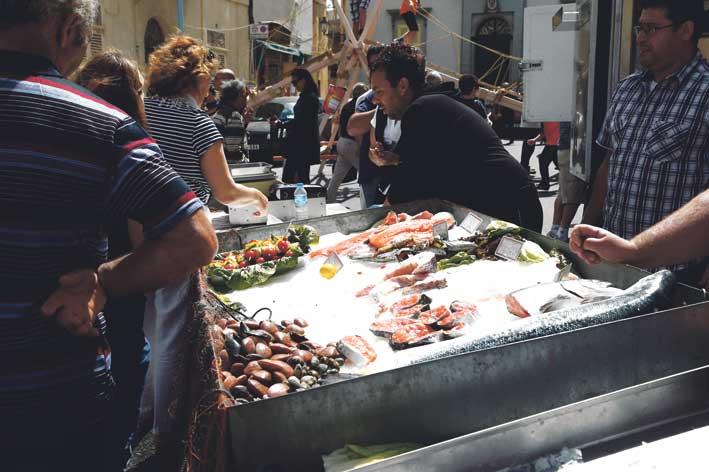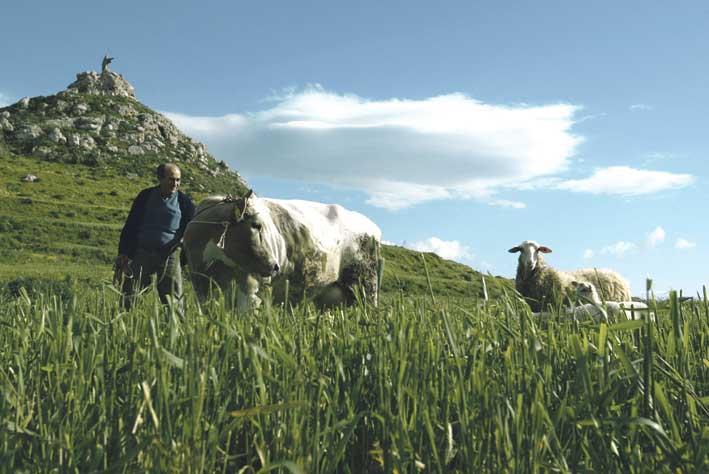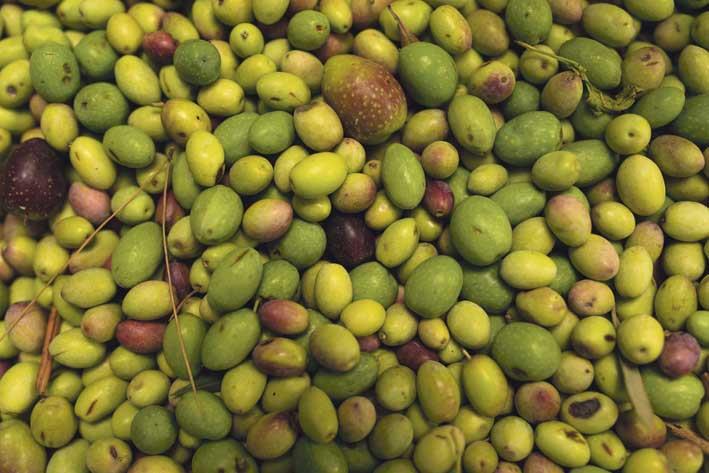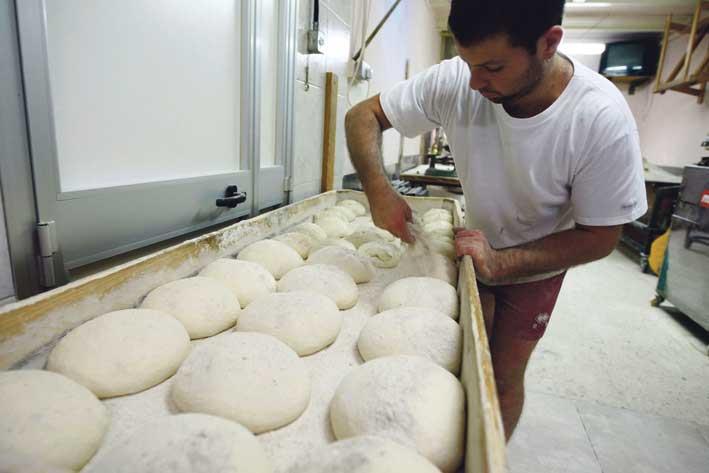First tell us something about you.
A privileged idealist and an ethnic misfit in both countries.
In your latest edition of 'The Food and Cookery of Malta and Gozo' which has just been published by Midsea Books, apart from recipes you also give us some interesting chapters, two of them about some of your passions such as the problems which have developed worldwide with beekeeping and honey, and overfishing for Bluefin Tuna. There are so many political, economic, medical, environmental, cultural, even ethical facets to what we eat. In your view is there any hope that these problems will be soon solved?
They won't be solved as long as the global corporations increase their stranglehold on food production (see the chapter on Food Sovereignty). Overfishing of the bluefin tuna can and should be stopped but the threat from bee decline is really serious. As for ethical issues the chapter on Vegetarianism looks at some of these. In order to save agricultural land non-vegetarians can learn to cut down their weekly consumption of meat. An acre of cereal produces five times more protein than an acre devoted to meat production.

You are a strong advocate of the Mediterranean diet. Since your home is now in England do you find it easy to follow this diet?
I have no difficulty in following the Mediterranean diet here in London, a multi-cultural city. We have Italian, Turkish and Middle Eastern shops and between these three I can get almost anything - including wild thyme honey, ġulebb tal-ħarrub, qara bagħli and ġdur and much more.
From what you have written you are a family of 'foodies'. Has this passion for food been passed on to your children?
Yes, my children are, if not actual "foodies", interested in good cooking and learning all the time. At least one of them has started to make bread.

What were your greatest challenges in writing this edition of your book... and the greatest joys?
The challenges came from having to use mostly secondary sources and in fitting time for research into a very active life. As the acknowledgements chapter shows I pay tribute to my sister Anne as she and I worked on the first three editions together. The joy came when the book was finally published after so many years and learning that it has been welcomed.
I see that you have a recipe 'A Small Sweet for a Great Tenor' which you have dedicated to our Joseph Calleja whom you have recently heard performing in Norma at The Royal Opera House, Covent Garden. Does he know about this recipe?
Yes, he wrote to say how much he liked receiving the book on the first night of "Norma"(12 September 2016) and that it made it even better to have that recipe named after him.
Do you have any particular favourite recipes from this collection?
I think 'Aljotta' (especially when real Mediterranean marjoram is used ( not oregano which is too strong) and Ross fil-Forn with plenty of saffron to celebrate the Phoenicians and the Knights.

Do you have a food prejudice? Something you would never eat.
I can't get to like caviar which is just as well in view of its cost. Other than that I eat everything and when my children were little I gave them the option to "not like" two things. Everything else they learned to eat and enjoy except that one has become vegetarian which is very laudable.
You're trapped on an island with an abundance of natural foods and can request a crate full of one condiment. What would it be?
Saffron again, assuming other herbs and spices would also be available.
How long did it take you to complete this edition?
Years and years; finding time for research, checking, adding and correcting. One could go on forever especially on developments related to the last three chapters.
What do you hope readers will take away from your book?
Enjoyment in cooking and a respect for food and for those who produce it by which I mean small scale producers. A commitment not to waste food and always to choose fruit and vegetables in season. "Sharing meals with family and friends is one of the joys of all societies and good cooking is central to it." For women and men who work outside the home (as well as in it) I would say that preparing good meals is still possible and preferable to convenience foods, if we organize ourselves in advance; often one can cook two meals at once so you have something ready for the next day. I would encourage bread-making; you won't put your local forn out of business if you just bake the occasional loaf. Never cut out bread - just eat it in moderation; much better than silly packaged cereals for breakfast, since you pay more for the packaging, the pictures, the words etc than the actual food inside.

In our conversations (and indeed in your book) you have lamented the fast disappearance of the "real" Maltese Hobza and at the end of your recipe of prinjolata you have remarked on the kind of rubbish that goes into some of our sweets as well as bread - 'all in the interests of saving on good ingredients and making more profit.' Can you comment on what is happening to the traditional Maltese 'hobza'?
Before the two world wars and even as late as the 1960s Maltese bread was made by the true sourdough method - which means that the dough was raised purely by a lactic acid fermentation of flour and water and the wild yeasts which are everywhere around us. The addition of brewers' yeast followed late, so that a different kind of bread appeared which is what we in Malta have been accustomed to eating for years. Every day a piece of the previous day's dough (Maltese "tinsila" - Italian "biga") would be added together with a very small amount of fresh yeast - so that a delicious sour flavour is present but is not the same as the classic sourdough mentioned above.
Now our ħobża is changing and deteriorating; you might care to ask your forn whether they still use the traditional method. Only a few of them are. Sadly, while in the rest of Europe and the UK people are re-discovering good unadulterated bread, in Malta until recently (the home of some of the best bread in the world ) we have regressed and adopted the disastrous British Chorleywood method which adds ascorbic acid and other dubious additives to the dough. Not only is this method used in supermarket sliced bread (which can be avoided) but it is also used in our Ħobż Malti. Your ħobża might look like the traditional time-honoured loaf but a difference can be detected if you look at the underneath of the loaf and in the texture when you cut it and come to eat it - cotton wool or polystyrene is how most people describe it.
The reason for the addition of these substances is, as ever, economic - the process is much less labour intensive because the ascorbic acid enables the dough to rise quickly (against the time-honoured slow-rise used by traditional bakers) and the other additives increase its keeping quality. It is a sad reflection of our society that we seem hell-bent on destroying the good things which we had good reason to be proud of, be it our traditional buildings as well as our famous bread. Of course where bread is concerned it all comes down to profits but I believe most of us would be prepared to pay more for real unadulterated bread rather than the one which is masquerading as a true ħobża. It seems unjust that bread which hitherto has been the same for rich and poor alike has evolved so that good, genuine, unadulterated bread is available only for those who are prepared to pay for it.
The Bread chapter in the book introduces readers to the joys of bread making - starting with a simple loaf and proceeding to our ħobża - though I stress that baking in an ordinary gas or electric oven will not produce anything like the loaf you buy from a good Maltese or Gozitan forn.
What's a quick dinner you can make to celebrate the publishing of your book?
I would make either ross fil-forn or true ħobż biż-żejt for supper (no tuna), with fresh ġbejniet and galletti, and some champagne.